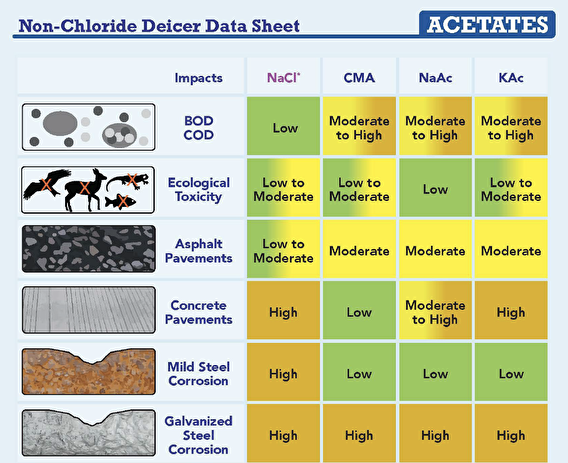In a Clear Roads project, researchers did an in-depth review of the properties of non-chloride deicers. They found that some products could potentially serve as viable salt substitutes in winter maintenance operations. The study will help agencies assess available alternatives to salt-based products and choose the best product for their deicing needs.

For the project, researchers reviewed and summarized the performance of 46 non-chloride deicing products, including environmental, infrastructure, and equipment impacts. This background served as the basis for two surveys inquiring about deicing products. The first survey asked state and local transportation agencies about their use of non-chloride deicers such as acetates, formates, or agriculture-derived products. Next, surveys of product manufacturers and vendors produced background and testing information about 20 non-chloride deicing products.
Researchers also evaluated non-chloride deicers or additives in the Clear Roads Qualified Products List (QPL), including the data requirements for listed and proposed products. These data sources illustrated the breadth of available information and whether it is sufficient to understand costs, impacts, and other considerations for using the products.
The project findings indicate that non-chloride deicers could be a viable option, as some perform better at colder temperatures, provide stronger protection against corrosion, and reduce environmental impacts compared to salt.
Almost half of the agencies responding to the survey indicated they use non-chloride products. The majority reported using sugar beet-derived products, which are blended with salt brine. Respondents cited better performance—including lower working temperatures—and decreased impacts to infrastructure and equipment as reasons for using the products. A few cited environmental preservation and a reduced use of salt as motivators.
The wealth of data compiled in this effort is summarized in data sheets for key non-chloride deicer categories:
- Acetates, such as sodium acetate, potassium acetate, and calcium magnesium acetate
- Formates, including sodium and potassium formate
- Glycols, including propylene and ethylene glycol
- Agricultural products, such as additives of beet juice, leaf extracts, and fruit pomaces.
The data sheets contain costs, application rates and temperatures, storage and handling considerations, and impacts to infrastructure, equipment, and the environment.
Learn more:
- Efficacy, Cost, and Impacts of Non-Chloride Deicers (Clear Roads, 2023)